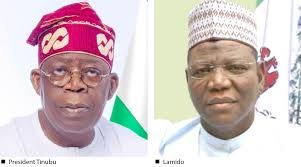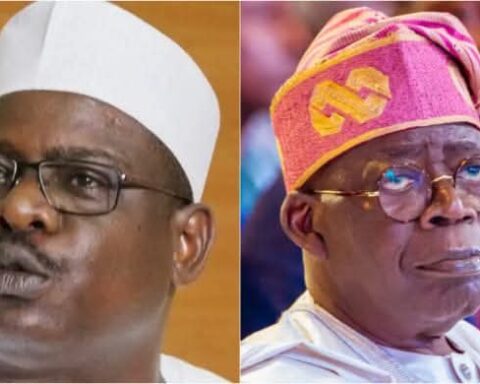In a sharp rebuttal to recent claims made by former Jigawa State Governor, Sule Lamido, Nigeria’s Minister of Solid Minerals, Dele Alake, has come out strongly in defense of President Bola Ahmed Tinubu’s legacy as a key figure in the historic June 12 pro-democracy struggle.
Lamido had stirred political waters over the weekend by suggesting that President Tinubu played a minimal role in the agitation that followed the annulled June 12, 1993 presidential election—widely regarded as Nigeria’s freest and fairest election, won by Chief Moshood Kashimawo Olawale (MKO) Abiola.
But in a statement issued Monday, Alake, a veteran journalist and longtime associate of President Tinubu, described Lamido’s remarks as “revisionist history” and “a distortion of the truth that millions of Nigerians witnessed.”
“Bola Ahmed Tinubu was not only a participant but one of the architects of the NADECO movement abroad,” Alake asserted.
“When many shrank in fear, he stood tall, funding, organizing, and mobilizing support for the restoration of democracy. To downplay his contribution is not just dishonest – it is disrespectful to the memory of those who paid the price for our current democracy.”
According to Alake, Tinubu’s sacrifices extended far beyond Nigeria’s borders. Forced into exile by the Abacha regime, Tinubu became a rallying point for pro-democracy forces in North America and Europe, using his resources and influence to sustain the National Democratic Coalition (NADECO) and other resistance platforms.
He also recounted how Tinubu, along with several others, risked life and property to ensure that the spirit of June 12 remained alive, even in the darkest days of military repression.
“Lamido may have his own perspective,” Alake added, “but facts are facts. Tinubu was a marked man, persecuted and hunted by a ruthless military regime. He didn’t flee for comfort—he fled to fight.”
Historians and political observers have weighed in as well, with many recalling Tinubu’s consistent support for MKO Abiola and his unwavering call for the validation of the 1993 election results.
While some critics argue that President Tinubu’s later political alignments and decisions may cloud his early activism, even they acknowledge that his role in the post-June 12 agitation cannot be easily erased.
As Nigeria continues to reflect on the meaning of June 12—now officially recognized as Democracy Day—Alake’s defense of Tinubu underscores the ongoing battle over how history is remembered and who is credited for its victories.
For many, it is a reminder that the struggle for democracy was neither the work of one man nor a single region, but a collective effort. Still, as Alake emphatically stated, “To suggest that Bola Tinubu was not a key player in that struggle is to deny the truth and insult the courage of those who stood with him.”
Follow us on all social media platforms @dailyquery for news and analyses around the globe.



























